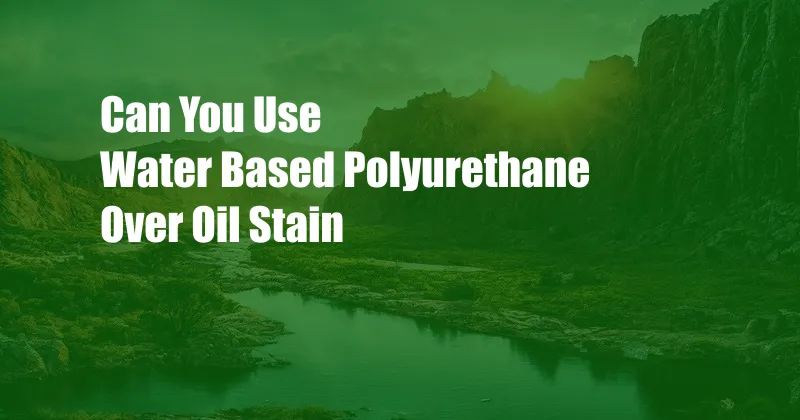
Can You Use Water Based Polyurethane Over Oil Stain?
In the world of home improvement projects, navigating the complexities of different finishes can be daunting. One question that often arises is whether water-based polyurethane can be applied over oil stain. To unravel this query, we’ll delve into the nuances of both oil stains and water-based polyurethane. We’ll explore their compatibility, the necessary preparation steps, and the techniques involved in achieving a seamless and durable finish.
Before we delve into the technicalities, let’s begin with a personal anecdote that highlights the significance of understanding the compatibility of different finishes. Several years ago, I was working on a project to restore an antique table that had been in our family for generations. The table had a beautiful oil-stained surface that had become dull and faded over time. Eager to restore its former glory, I decided to apply a fresh coat of water-based polyurethane to protect and enhance its finish.
To my dismay, after applying the polyurethane, the finish bubbled and peeled, leaving the table looking worse than before. I had neglected to consider the incompatibility between oil stain and water-based polyurethane. The oil stain had created a barrier that prevented the water-based polyurethane from adhering properly to the surface.
Understanding Finishing Compatibility
To avoid similar pitfalls, it’s crucial to understand the compatibility of different finishes. Oil stains are typically made from drying oils, such as linseed oil or tung oil. These oils penetrate deep into the wood, creating a protective and durable finish. Water-based polyurethanes, on the other hand, are made from water-soluble resins and solvents. They form a clear, protective layer on top of the wood.
The key to compatibility lies in the chemical composition of the finishes. Oil stains are non-polar, meaning they are not soluble in water. Water-based polyurethanes, on the other hand, are polar, meaning they are soluble in water. This fundamental difference in polarity makes it difficult for water-based polyurethane to adhere to an oil-stained surface.
Can Water Based Polyurethane Be Used Over Oil Stain?
The simple answer is no. Applying water-based polyurethane directly over oil stain will result in poor adhesion and a compromised finish. The water-based polyurethane will not be able to penetrate the oil stain and will likely peel or bubble. To achieve a durable and aesthetically pleasing finish, it is essential to properly prepare the oil-stained surface before applying water-based polyurethane.
There are two main methods for preparing an oil-stained surface for water-based polyurethane: sanding and chemical stripping. Sanding involves using sandpaper to remove the oil stain from the surface of the wood. This method is time-consuming and requires a significant amount of effort, especially if the oil stain has penetrated deeply into the wood. Chemical stripping involves using a chemical stripper to dissolve the oil stain. This method is more effective than sanding but requires proper ventilation and safety precautions.
Expert Tips for Applying Water Based Polyurethane Over Oil Stain
Once the oil stain has been removed, the surface should be thoroughly cleaned and allowed to dry completely. To ensure a smooth and even finish, it is recommended to apply a thin coat of sanding sealer before applying the water-based polyurethane. Sanding sealer will help to seal the wood and prevent the polyurethane from absorbing into the wood too quickly. After the sanding sealer has dried, apply two to three thin coats of water-based polyurethane, allowing each coat to dry completely before applying the next.
For optimal results, use a high-quality water-based polyurethane that is specifically designed for use over oil stains. Follow the manufacturer’s instructions carefully and ensure that the surface is properly prepared before applying the polyurethane. With proper preparation and application techniques, you can achieve a beautiful and durable finish that will protect and enhance your oil-stained surface for years to come.
FAQ on Water-Based Polyurethane and Oil Stain
Q: Can I use oil-based polyurethane over water-based stain?
A: Yes, oil-based polyurethane can be applied over water-based stain. However, it is important to allow the water-based stain to dry completely before applying the oil-based polyurethane. Failure to do so may result in poor adhesion and a compromised finish.
Q: What is the best way to remove oil stain from wood?
A: The best way to remove oil stain from wood is to use a chemical stripper. Chemical strippers are available at most hardware stores. Follow the manufacturer’s instructions carefully and ensure that the area is well-ventilated.
Q: How do I know if my water-based polyurethane is compatible with my oil stain?
A: To test the compatibility of your water-based polyurethane with your oil stain, apply a small amount of the polyurethane to an inconspicuous area of the oil-stained surface. Allow the polyurethane to dry completely and observe the results. If the polyurethane does not peel or bubble, it is compatible with the oil stain.
Q: How many coats of water-based polyurethane should I apply?
A: The number of coats of water-based polyurethane you need to apply will depend on the desired level of protection and finish. For most applications, two to three coats are sufficient.
Conclusion
Understanding the compatibility of different finishes is essential for successful woodworking projects. By following the tips and advice outlined in this article, you can achieve beautiful and durable finishes that will protect and enhance your woodworking creations. So, next time you’re contemplating applying water-based polyurethane over oil stain, remember to properly prepare the surface to ensure a flawless and long-lasting finish.
Are you interested in learning more about the compatibility of different finishes? Join our online forum and connect with fellow woodworkers to discuss your projects and share your experiences.